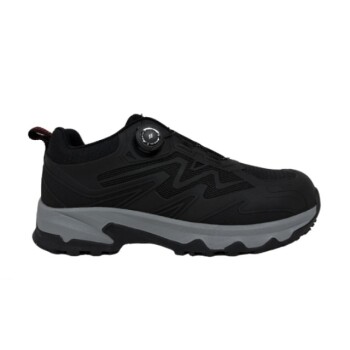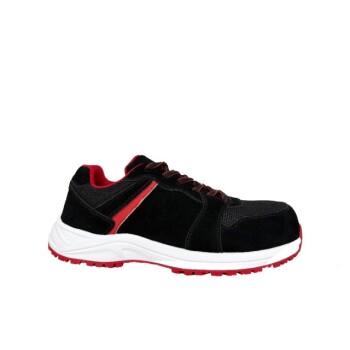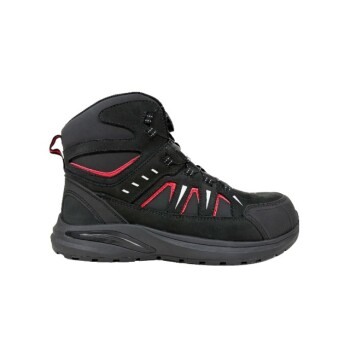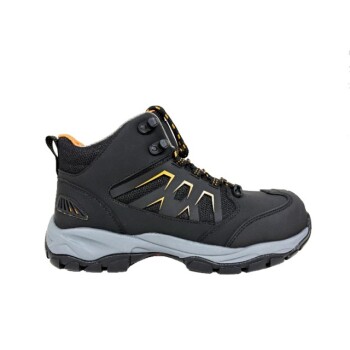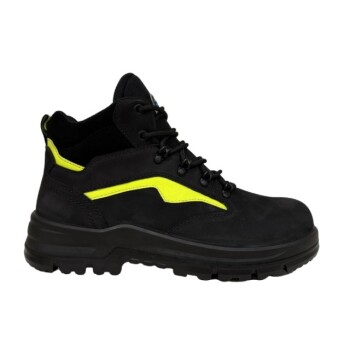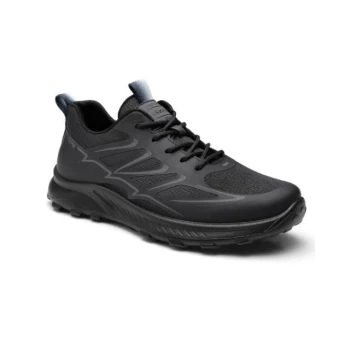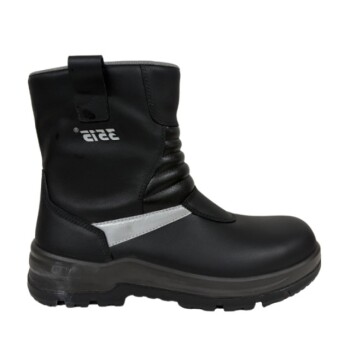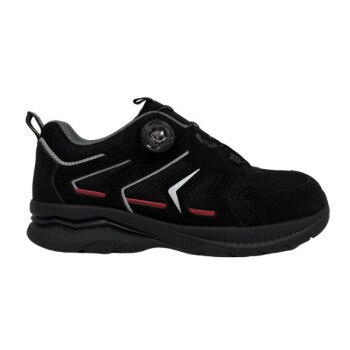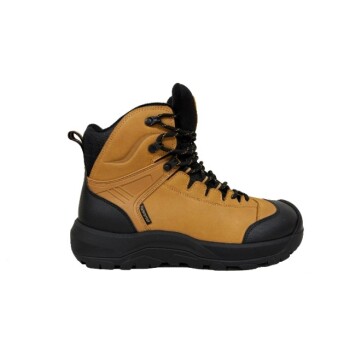The industries that benefit most from slip-resistant footwear are those where workers frequently encounter wet, greasy, or otherwise unpredictable surfaces. This includes hospitality and food service, healthcare, construction, manufacturing, and various mobile professions like delivery services, where preventing slips, trips, and falls is a critical safety priority.
The need for slip-resistant footwear isn't defined by an industry's name, but by the specific hazards present in its work environment. The core challenge is mitigating the risk of falls on compromised surfaces, a danger common across a surprisingly wide range of professions.
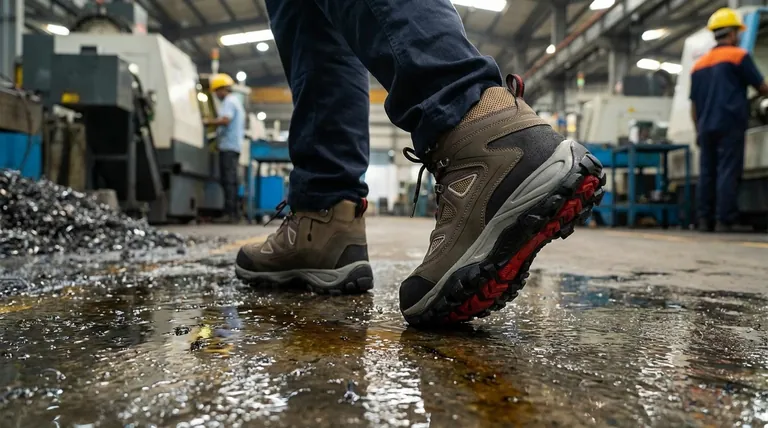
The Common Denominator: Unpredictable Surfaces
At its core, the requirement for specialized footwear comes down to the floor itself. Different industries present unique challenges that standard shoes are not equipped to handle, making slip-resistance a foundational element of personal protective equipment (PPE).
Environments with Liquid Spills
Sectors like hospitality, food service, and healthcare are defined by smooth, hard-surface floors that are frequently exposed to liquids.
Spills from drinks, food, cleaning solutions, or bodily fluids create an immediate and often invisible slip hazard. Slip-resistant soles are engineered with tread patterns that channel liquids away from the point of contact, maintaining grip.
Workplaces with Grease and Oil
Industrial manufacturing, automotive repair, and factory settings often deal with lubricants, oils, and chemical residues on the floor.
These viscous substances are particularly dangerous as they can defeat standard shoe treads. True slip-resistant shoes for these environments use special rubber compounds that resist degradation from oils and maintain their gripping properties.
Exposure to Natural Elements
Many jobs require navigating surfaces compromised by weather and terrain. This is a primary concern for construction, roofing, agriculture, and maritime workers.
Whether it's a rain-slicked roof, a muddy agricultural field, or a constantly wet ship deck, the footwear must provide reliable traction on uneven and often unstable ground.
High-Paced and Mobile Roles
Professions that involve constant movement across varied and unknown terrains also see significant benefits. This includes delivery drivers, law enforcement, and utility workers.
These professionals cannot predict the condition of every surface they will walk on throughout their day. Slip-resistant footwear provides a consistent baseline of safety, reducing the risk of a fall while entering a building, crossing a parking lot, or navigating a client's property.
Beyond Grip: Specialized Protective Features
While preventing slips is the primary goal, footwear in these industries often incorporates other critical safety features. The sole is just one part of a complete protective system.
Impact and Puncture Resistance
For construction and factory workers, the risk of falling objects or stepping on sharp debris is constant.
Many work boots integrate steel or composite toes to protect against crushing injuries and reinforced plates in the sole to prevent punctures. This protection is essential for compliance with OSHA and other safety regulations.
Material and Chemical Resistance
In settings like healthcare, agriculture, and maritime work, the shoe's material is as important as its tread.
Healthcare footwear may need to be sterilizable or bacteria-resistant. Agricultural boots must withstand mud and pesticides, while maritime shoes must resist corrosion from saltwater.
All-Day Comfort and Support
Workers in every high-risk industry spend most of their day on their feet. Lack of proper support leads to fatigue, which can increase the likelihood of accidents.
Modern safety footwear includes features like cushioning, arch support, and ergonomic design to enhance productivity and reduce physical strain over a long shift.
Making the Right Choice for Your Environment
Choosing the correct footwear requires matching its features to the specific hazards of your job.
- If your primary focus is wet and spill-prone indoor floors: Prioritize shoes with soft rubber soles and intricate tread patterns designed to channel water, common in food service and healthcare.
- If your primary focus is industrial hazards: Select certified safety boots with oil-resistant soles, reinforced toes, and puncture protection suitable for factories and construction sites.
- If your primary focus is outdoor and varied terrain: Look for durable, waterproof boots with deep, aggressive lugs for maximum grip on mud, inclines, and unstable surfaces.
Ultimately, investing in the right slip-resistant footwear is a direct investment in your personal safety and well-being on the job.
Summary Table:
| Industry | Primary Hazard | Key Footwear Feature |
|---|---|---|
| Hospitality & Food Service | Liquid spills on hard floors | Water-channeling treads |
| Healthcare | Spills, sanitation needs | Slip-resistant, easy-to-clean materials |
| Manufacturing & Industrial | Grease, oil, debris | Oil-resistant soles, puncture protection |
| Construction & Agriculture | Mud, uneven terrain | Deep-lugged, durable outsoles |
| Delivery & Mobile Services | Varied, unknown surfaces | All-day comfort, reliable grip |
Protect your team and boost productivity with the right safety footwear.
As a large-scale manufacturer, 3515 produces a comprehensive range of slip-resistant footwear for distributors, brand owners, and bulk clients. Our production capabilities encompass all types of safety shoes and boots, tailored to meet the specific hazards of your industry—from oil-resistant soles for factories to waterproof designs for outdoor work.
We help you reduce workplace accidents, ensure regulatory compliance, and provide all-day comfort for your workforce.
Contact 3515 today for a custom solution that fits your safety needs.
Visual Guide
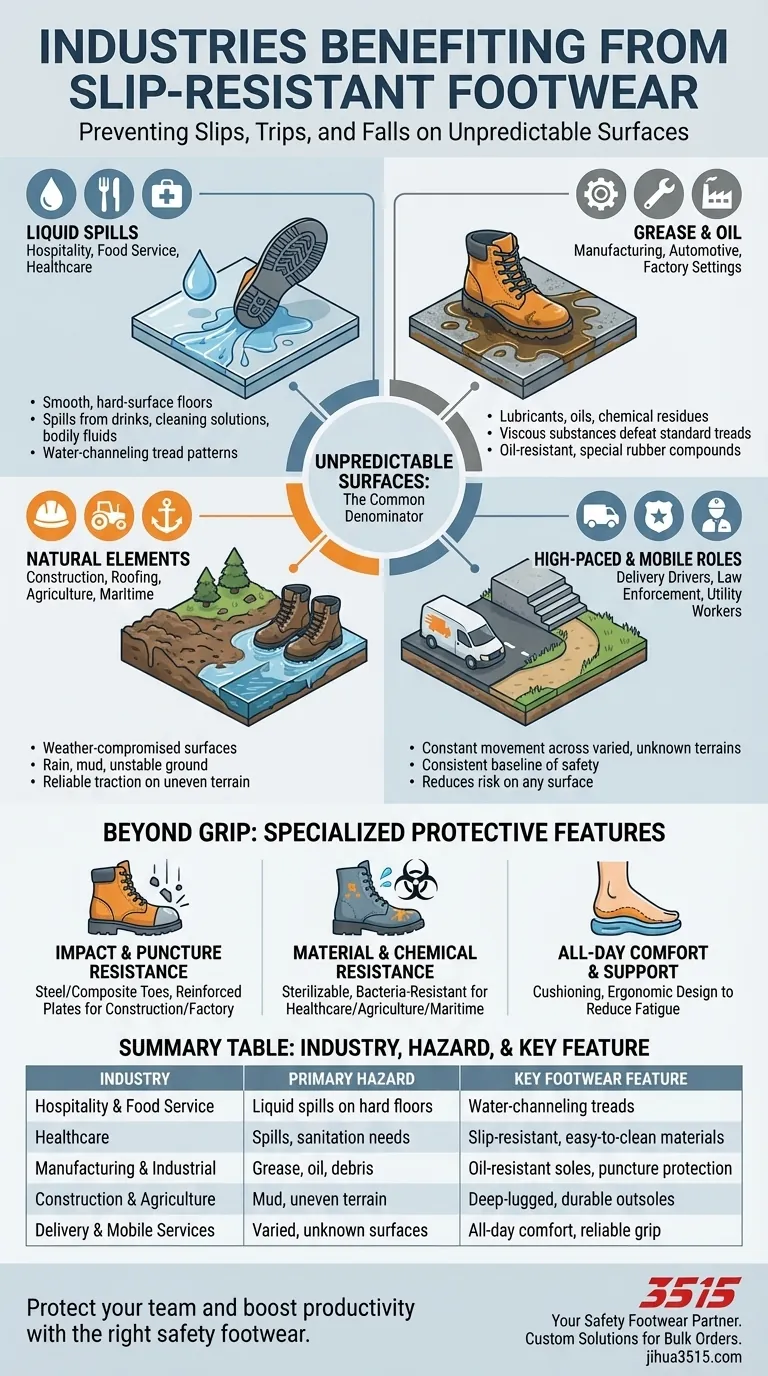
Related Products
- Safety Footwear Wholesale Manufacturer for Custom OEM/ODM Production
- Advanced KPU Athletic Safety Shoe with Steel Toe Cap Anti-Slip Rotary Lacing System
- Premium Suede Sport Safety Shoes for Wholesale & Bulk Orders
- Wholesale Customizable Safety Boots Durable & Protective Footwear Manufacturing
- Heavy Duty Nubuck Safety Boots Safety Shoes for Global Distribution
People Also Ask
- What are the cultural perspectives on wearing shoes in the house? A Guide to Home Etiquette & Hygiene
- What are the primary protective functions of composite-toe boots? A Guide to Modern Safety Footwear
- Are employers required to provide steel-toe rubber boots at no cost to employees? Yes, under OSHA rules.
- What materials are used for safety toes? Choose Steel, Composite, or Aluminum for Your Work Boots
- Is it normal to wear shoes in the house? A Guide to Hygiene, Comfort & Culture

